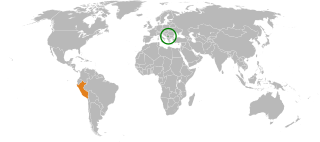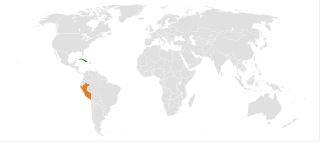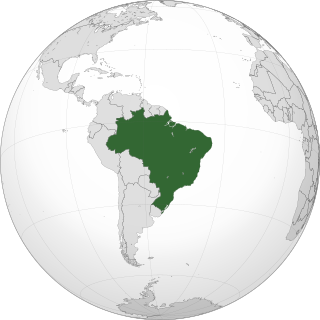
After independence in 1964, Malta followed a policy of close co-operation with NATO countries. Since 1971, the country sought relations with the rest of the world, including communist countries in Eastern Europe and the non-aligned countries.

The foreign policy of the Hugo Chávez administration concerns the policy initiatives made by Venezuela under its former President, Hugo Chávez, towards other states. Chávez's foreign policy may be roughly divided into that concerned with United States-Venezuela relations and that concerned with Venezuela's relations with other states, particularly those in Latin America and developing countries on other continents. In many respects the policies of the Chávez government were substantially different from the previous administrations that governed Venezuela.

International relations between the Republic of Chile and the Argentine Republic have existed for decades. The border between the two countries is the world's third-longest international border, which is 5,300 km (3,300 mi) long and runs from north to south along the Andes mountains. Although both countries gained their independence during the South American wars of liberation, during much of the 19th and the 20th century, relations between the countries were chilly as a result of disputes over the border in Patagonia. Despite this, Chile and Argentina have never been engaged in a war with each other. In recent years, relations have improved. Argentina and Chile have followed quite different economic policies. Chile has signed free trade agreements with countries such as China, the United States, Canada, South Korea, as well as European Union, and it's a member of the APEC. Argentina belongs to the Mercosur regional free trade area. In April 2018, both countries suspended their membership from the UNASUR.

Brazil–South Africa relations are the bilateral relations between the Federative Republic of Brazil and the Republic of South Africa. Both nations are members of the BRICS, Cairns Group, G20, Group of 24, Group of 77 and the United Nations.

Foreign relations between the Argentine Republic and the Republic of Peru, have existed for over a century. Both countries established diplomatic relations on July 10, 1822. Both nations are members of the Community of Latin American and Caribbean States, Group of 77, Organization of American States, Organization of Ibero-American States and the United Nations.

Kosovo–Peru relations are foreign relations between Kosovo and Peru. Peru recognised Kosovo in 2008 after its declaration of independence from Serbia, although formal relations have not been established.

Abkhazia–Venezuela relations refers to bilateral relations between the breakaway Republic of Abkhazia and Venezuela. Venezuela recognised Abkhazia, along with South Ossetia, on 10 September 2009, almost ten years after the country declared independence from Georgia in 1999. Venezuela was the third state to recognise Abkhazia and South Ossetia, after Russia and Nicaragua.

China–Peru relations are foreign relations between the People's Republic of China and the Republic of Peru. Peru is the first Latin American country that China established formal ties with, which was done by the Qing dynasty in August 1875. Both nations are members of the Asia-Pacific Economic Cooperation and the United Nations.

Cuba–Peru relations are the relations between the Republic of Cuba and the Republic of Peru.

Mexican-Peruvian relations are the historical and current bilateral relationship between the United Mexican States and the Republic of Peru. Both nations are members of the Asia-Pacific Economic Cooperation, Community of Latin American and Caribbean States, Lima Group, Organization of Ibero-American States, Organization of American States, Pacific Alliance and the United Nations.

Brazil and Indonesia established diplomatic relations in 1953. Both are large tropical countries endowed with rich natural resources, Brazil and Indonesia possess the largest tropical rain forest of the world that contains the world's richest biodiversity, which gave them a vital role in global environment issues, such as ensuring tropical forests protection. Both countries lead the list of Megadiverse countries with Indonesia second only to Brazil.

Luis María Kreckler is an Argentine diplomat who served as ambassador of his country to the Federative Republic of Brazil between 2012 and 2015. A career diplomat, he previously served as Secretary of Trade and International Economic Relations (2010-2011) and Undersecretary for International Trade (2005-2010) at the Ministry of Foreign Affairs and Worship of Argentina. In 2016 he was appointed ambassador to Germany.

Japan–Peru relations are the current and historical relations between Japan and Peru. Both nations are members of the Asia-Pacific Economic Cooperation, Comprehensive and Progressive Agreement for Trans-Pacific Partnership and the Forum of East Asia–Latin America Cooperation.

France–Peru relations are the diplomatic relations between the French Republic and the Republic of Peru. Both nations are members of the United Nations and the World Trade Organization.

El Salvador–Peru relations are the diplomatic relations between the Republic of El Salvador and the Republic of Peru. Both nations are members of the Community of Latin American and Caribbean States, Group of 77, Organization of American States, Organization of Ibero-American States and the United Nations.

Brazil–Venezuela relations are the diplomatic relations between the bordering countries of Brazil and Venezuela.

Brazil–Yugoslavia relations were historical foreign relations between Brazil and now split-up Yugoslavia. Following the breakup of Yugoslavia and ratification of the Agreement on Succession Issues Slovenia, one of five sovereign equal successor states, has taken over properties of the Embassy of Yugoslavia in Brasilia.

Georgia–Peru relations are the bilateral relations between Georgia and Peru. Both countries are members of the United Nations and of the Pacific Alliance, with Georgia being an observer of the latter.


















